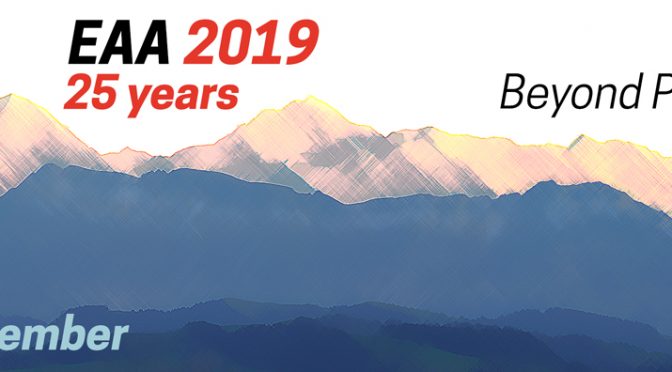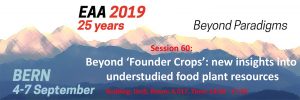BEYOND “FOUNDER CROPS”: NEW INSIGHTS INTO UNDERSTUDIED FOOD PLANT RESOURCES
Building: UniS
Room: A 017
Time: 14:00 – 17:30
Organisers:
Caracuta, Valentina (Institut de Science de l’Ecologie de Montpellier)
Antolin, Ferran (Integrative Prähistorische und Naturwissenschaftliche Archäologie – IPNA, University of Bern)
14:00 INTRODUCTION
14:15 RE-DEFINING THE “FOUNDER PLANTS” IN SOUTHWEST ASIA
Arranz Otaegui, Amaia (University of Copenhagen)
14:30 LOST IN THE MISTS OF TIME – FABA BEAN (VICIA FABA) AN OVERLOOKED FOUNDER CROP
Caracuta, Valentina (Institut des Science de l’Ecologie de Montpellier)
14:45 GROWING EAST ASIAN MILLETS: EXPERIMENTAL AND MORPHOLOGICAL STUDIES ON FOXTAIL MILLET (SETARIA ITALICA) AND RELATED WEEDY TAXA
Lee, Gyoung-Ah – Vaughn, Maria – Kneisly, Angelica (University of Oregon)
15:00 OLIVE AND GRAPE IN PREHISTORIC AEGEAN: RESEATING THE RESEARCH AGENDA
Margaritis, Evi (The Cyprus Institute) – Pagnoux, Clemence (LIRA Laboratory, Department of Archaeology, University of Thessaloniki)
15:15 OIL AND FIBRE PLANTS DURING THE NEOLITHIC PERIOD IN THE NORTHWEST MEDITERRANEAN REGION AND NORTH OF ALPS
Jesus, Ana – Antolín, Ferran (Universität Basel; Integrative Prehistory and Archaeological Science – IPAS) – Bouby, Laurent (University of Montpellier)
15:30 OAT DOMESTICATION: ARCHAEOBOTANICAL EVIDENCE FROM PREHISTORIC EUROPE
McClatchie, Meriel (University College Dublin) – Murphy, Charlene – Fuller, Dorian (University College London)
15:45 DISCUSSION SLOT
16:30 CRAB APPLE IN PREHISTORIC EUROPE: FROM THE NEOLITHIC “GOLDEN AGE” UNTIL THE ARRIVAL OF THE DOMESTICATED FORM
Antolin, Ferran (Integrative Prehistory and Archaeological Science) – Brinkkemper, Otto (Cultural Heritage Agency of the Netherlands) – Kirleis, Wiebke (Kiel University) – Pelling, Ruth (Historic England)
16:45 INTRODUCTION AND DISTRIBUTION OF CULTIVATED AND WILD PLANTS IN EUROPE FROM 8000 – 800 BCE BASED ON LINGUISTICS AND ARCHAEOBOTANY
van Amerongen, Yvonne (Leiden University Centre for Linguistics; Archaeological Research Leiden) – Kroonen, Guus (Leiden University Centre for Linguistics; Department of Nordic Studies and Linguistics, University of Copenhagen)
17:00 DISCUSSION SLOT


